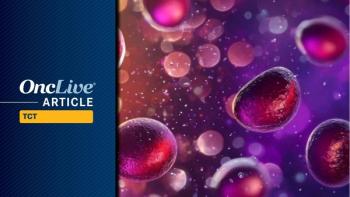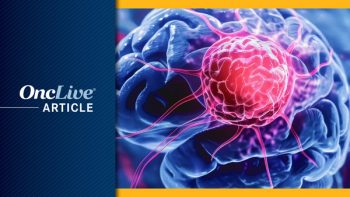
Optimizing the Use of CAR T-Cell Therapy in Lymphoma
Transcript:
David Maloney, MD, PhD: I think we are in early days and exciting times. We have 2 approvals in the field for lymphoma for twice relapsed large cell lymphoma, and a third contender. But we’re all transplanters, or many of us are transplanters, here. Does this have the potential to actually replace transplant?
Leo I. Gordon, MD, FACP: That’s a great question, and I think that’s becoming the burning question. I think we’ll talk some more about this. But there are trials that are addressing your question exactly. There are randomized trials ongoing now that look at patients who have had either recurrence within a year on R-CHOP [rituximab/cyclophosphamide/hydroxydaunomycin/Oncovin/prednisone] with large cell lymphoma, that is the relapsed group, or who are refractory. And they’re being randomized now to either CAR T or standard therapy, which is chemotherapy followed by autologous stem cell transplant. And there are 3 trials. I think the Novartis group is going to be doing the BELINDA study; there’s the ZUMA-7 trial from Kite; and then there’s the TRANSFORM study from Juno Therapeutics. And those are almost identical studies, which are going to address that question. I think we don’t know the answer to that yet.
Michael Pulsipher, MD: I think we need to be careful though as we pick patients because we know that the majority of lymphoma patients can be cured with upfront chemotherapy. And we know that if someone has a relatively late relapse and is highly responsive, maybe they don’t need CAR T, especially if treatment is incredibly expensive. But picking the right patient population for CAR T cells is going to make a big difference going forward.
Matthew Lunning, DO: And I think the way the 3 trials are, they’ve really homed in on the best population. Obviously, primary refractory large cell lymphoma is very concerning, but it’s also concerning if you relapse within 1 year of primary induction. So I think the population that’s being studied right now is an appropriate question given the data that we have from the ongoing trials that led to commercial approval.
David Maloney, MD, PhD: But I was struck by if you take 100 people with relapsed large cell lymphoma, we don’t cure very many of them with a transplant. At the end of the day, it’s 10 patients. That means about 90 of those 100 patients fail somewhere along the line. They either don’t get into remission and can’t get to a transplant or they actually get to a transplant but they still relapse. And so there’s a tremendous opportunity for the CAR T products to potentially win in many avenues of this disease.
Matthew Lunning, DO: I’ve been amazed, actually, at the number of people who are coming in and talking about CAR T-cell therapy, and you’re trying to talk to them about second-line chemotherapy and a transplant. It’s a fluid conversation in that situation where, OK, we can talk about CAR T cell, but there are still going to be patients who are in PET [positron emission tomography]-negative CR [complete response] who I think, based upon that response, should get the opportunity to go to transplant.
David Maloney, MD, PhD: What we know about long-term durability is only out to about 2 years. I guess we’re still hopeful that that’s going to result in long-term disease-free survival.
Nilanjan Ghosh, MD, PhD: Since we see not too many relapses between 3 and 6 months and the 2 years, we can be hopeful that when it goes up to 5 years that drop-off is early enough such that it’s a plateau. But I think the important thing is does this relate to persistence of CAR T cells? I think in the ZUMA-1 two-year update, there were patients who did not have persistence of CAR T cells but still were in a CR. But, if you think about it, that’s a very interesting question. We are thinking of more of an immunologic effect over here, but you don’t necessarily need to have lifelong persistence of cells. When we transplant patients, we don’t have lifelong persistence of BM [bone marrow] or things like that, and still a percentage of patients are cured. It’s possible that even if you don’t have lifelong persistence and you achieved enough in the early period to kill off those resistance lymphoma cells, you may have a durable response.
Michael Pulsipher, MD: I think the hope is warranted and it’s appropriate, but I think we also need to keep in mind that this is an entirely different type of therapy. And so we’re basing our assumptions on our chemotherapy data and our transplant data, but CAR T-cell therapy may be different. We’ve got to get them out longer to really know.
Nilanjan Ghosh, MD, PhD: Absolutely.
Leo I. Gordon, MD, FACP: The way I’d like to think about this when I discuss this with patients is to first talk about autologous transplant and the data with autologous transplant. I talk about an allogeneic transplant, which in every case, I would prefer because the data in control of the lymphoma are better for allogeneic transplant versus autologous transplant except for graft versus host disease, which is the limiting toxicity. And the mortality is the reason that allogeneic transplant overall is not better. But the way I think about this is as an allogeneic transplant without the graft versus host disease. And maybe that’s scientifically not exactly right, but I think it’s similar.
David Maloney, MD, PhD: These approvals are in aggressive lymphomas. What about some of the other histologies, do we have any data?
Leo I. Gordon, MD, FACP: There are some enticing data from Steve Schuster, MD and the University of Pennsylvania data from using the Novartis product and their own product in follicular lymphoma. And I think you have some data at your institution in follicular lymphoma.
David Maloney, MD, PhD: Yes, we have data with JCAR014, which is a precursor to the JCAR017, and there we’ve seen a high incidence of complete remissions with very rare relapses. Again, with short follow-up, this appears to be tremendously exciting. And I know a number of the companies are running clinical trials now. I think ZUMA-5 is the trial in follicular and marginal cell lymphoma with the axicabtagene. And similar product studies are going on.
Transcript Edited for Clarity




































